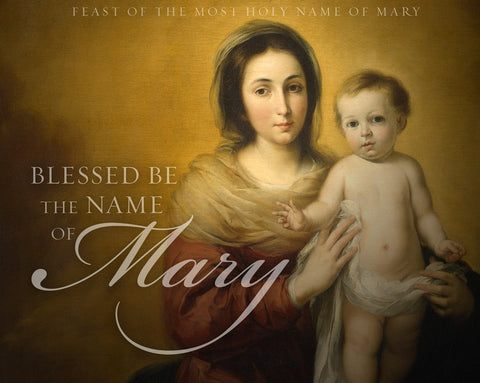The Catholic Church celebrates the Feast of the Holy Name of Mary every September 12th. This observance, deeply rooted in history and tradition, commemorates the profound significance of Mary's name and her role in salvation. The feast is not only a reminder of her unwavering devotion but also a testament to the extraordinary power and protection associated with the Holy Name of Mary.
The Feast's Origins
The Feast of the Holy Name of Mary finds its origins in a historic moment of divine intervention. In 1683, Europe faced a formidable threat: the Ottoman Empire, led by Sultan Mehmed IV, was advancing towards Vienna, Austria, with the intent to conquer the city. In this dire hour, Pope Innocent XI called upon the Christian faithful to seek the intercession of the Blessed Virgin Mary, under the title of the Holy Name of Mary.
In response to these prayers, the tide of battle miraculously turned. On September 12, 1683, the combined Christian forces, under the command of King John III Sobieski of Poland, secured a decisive victory at the Battle of Vienna. In gratitude for this triumph, Pope Innocent XI instituted the Feast of the Holy Name of Mary to be celebrated annually on September 12th.
The Significance of the Feast
The Feast of the Holy Name of Mary is not merely a historical commemoration. It holds profound spiritual significance for Catholics worldwide. Mary, whose name means "Star of the Sea," is revered as the Mother of God and the Queen of Heaven. Her name symbolizes purity, grace, and divine intercession.
This feast reminds us of the importance of Mary's role in salvation history. She willingly accepted God's call to become the Mother of Jesus, and through her "yes" (fiat), she brought salvation into the world. Her name is a beacon of hope and a source of strength for believers, a reminder that through her intercession, we can find grace, guidance, and protection.
The Power of the Holy Name of Mary
The Holy Name of Mary carries a unique spiritual power. It is a name that demons fear, and its invocation is a source of strength against evil. Saints throughout history have attested to the efficacy of calling upon the Holy Name of Mary in times of temptation and spiritual battle.
St. Anthony of Padua, known for his eloquence and wisdom, once declared, "The devils are not afraid of me, but of you when you make the Sign of the Cross and say the Holy Name of Mary."
The annals of Catholic history are replete with stories of saints who, in their battles against demonic forces, relied on the Holy Name of Mary as a powerful weapon. St. Dominic, the founder of the Dominican Order, frequently invoked the Holy Name of Mary in his battles against heresy. His devotion to Mary and her name was instrumental in combating the Albigensian heresy in the 13th century.
In more recent times, the renowned exorcist, Fr. Gabriele Amorth, recounted numerous encounters with possessed individuals who, when confronted with the name of Mary, would react with dread and resistance. Demons often confessed their fear of the Holy Name of Mary, acknowledging its potency in weakening their grip on the afflicted souls.
Conclusion
The Feast of the Holy Name of Mary is a beautiful celebration of faith, history, and spiritual power. It reminds us of the pivotal role that Mary plays in the Christian narrative and the strength that her name offers to believers. As we commemorate this feast, we are encouraged to reflect on the significance of Mary's name in our own lives, seeking her intercession, protection, and guidance.
In times of spiritual struggle, we can take solace in the words of St. Bernard of Clairvaux, who said, "In dangers, in doubts, in difficulties, think of Mary, call upon Mary." The Holy Name of Mary is a refuge and a source of grace, a reminder that, like the Battle of Vienna, with faith and devotion, we too can overcome the challenges that we face, secure in the knowledge that Mary, our Mother, stands by our side, her name a beacon of hope and salvation.

